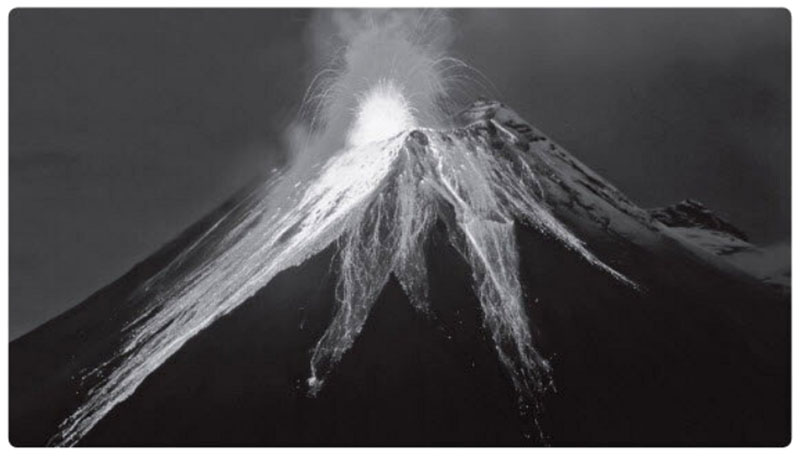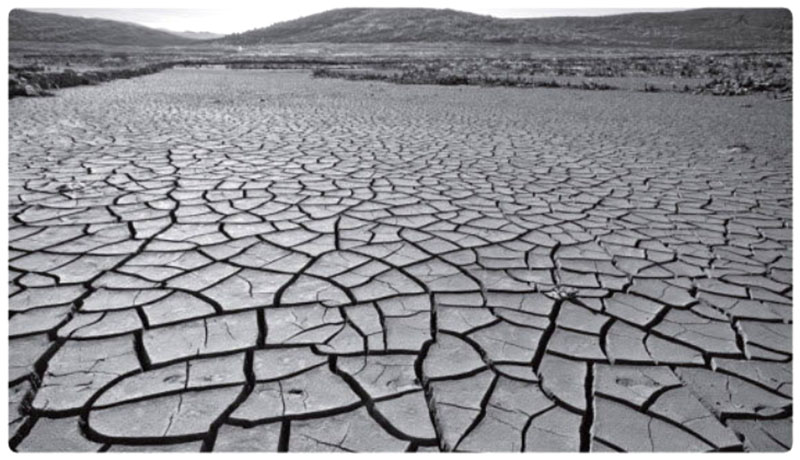1. Match the words below with definitions 1-10.
avalanche drought earthquake epidemic famine
flood forest fire mudslide tsunami volcanic eruption
1 A(n) ………………………… is when the ground shakes and buildings collapse.
2 A(n) ………………………… is when hot rocks, fire and steam suddenly come out of the ground.
3 A(n) ………………………… is when water covers the ground in places which are usually dry.
4 A(n) ………………………… is when snow and ice fall quickly down a mountain.
5 A(n) ………………………… is a long period of time without enough food in a region.
6 A(n) ………………………… is a very large and long wave following an earthquake under the ocean.
7 A(n) ………………………… is when there is no rain for a long time.
8 A(n) ………………………… is a fire that spreads quickly through a large area of trees.
9 A(n) ………………………… is when a serious disease spreads to lots of people.
10 A(n) ………………………… is when a large quantity of wet earth suddenly falls down the side of a hill.
Answer
1 earthquake 2 volcanic eruption 3 flood
4 avalanche 5 famine 6 tsunami 7 drought
8 forest fire 9 epidemic 10 mudslide
2. Label photos A and B with the natural disaster words from exercise 1.

A ………………….

B ………………….
Answer
Photos: A volcanic eruption B drought
Listening Strategy
It is important to be able to identify the context of the listening, i.e. who is speaking, where and when they are speaking, and what the situation is. This is not always obvious, so listen carefully for clues to help you.
3. Read the Listening Strategy. Then listen to two dialogues and answer the questions. Write the clues which gave you the answers.
Dialogue 1
1 Where are they? ……………………………………………………..
Clues: ……………………………………………………..
2 What natural disaster caused the damage? ……………….
Clues: ……………………………………………………..
Dialogue 2
3 What kind of natural disaster are they discussing? ………………
Clues: ……………………………………………………..
4 What time of day is it? ………………………………………………
Clues: ……………………………………………………..
Answer
Dialogue 1: They are in Mrs Dennington’s home. A flood caused the damage.
Dialogue 2: They’re discussing a drought. It is early morning; they are having breakfast.
Transcript
1
Man Hi. Mrs Dennington?
Woman Yes, that’s me. Are you Mr Jones?
M Yes.
W Come in, come in.
M Hmm. I can see straight away there’s a lot of damage here!
W Yes. It was about twenty centimetres deep in my living room!
M So, what would you like me to look at?
W Well, this wall by the kitchen. The water made a few holes near the bottom.
M Oh yes, I see.
W Is it safe?
M Safe? Yes, perfectly safe. You don’t need to worry about that. But it doesn’t look very good!
W So can you fix it?
M Yes, of course. I suppose it’s about two days’ work, so … let’s say £300.
W That’s fine. When can you do it?
2
Man Did you read this article?
Woman Which one?
M About California. They need rain!
W Really?
M Yes. It says here that in some places it didn’t rain at all during the whole winter! The ground is so dry. Look at this photo.
W That’s amazing.
M What are you having for breakfast?
W Just toast and jam. Do you want a piece?
M Hmm. No, I fancy eggs.
W We haven’t got any eggs.
M I can buy some at the shop next door.
W It isn’t open yet. You need to wait about twenty minutes.
M Forget that, toast and jam is fine.
4. Listen to four extracts. Match each extract with a natural disaster from exercise 1.
1 Natural disaster: …………………………………………………
2 Natural disaster: …………………………………………………
3 Natural disaster: …………………………………………………
4 Natural disaster: …………………………………………………
Answer
1 famine 2 tsunami 3 epidemic 4 volcanic eruption
Transcript
see exercise 5.
5. Listen again and choose the correct answers.
1 The dialogue takes place
a in a shopping centre.
b in the street.
c in a supermarket.
2 The disaster happened while the speaker
a was on holiday in Japan.
b was in a business meeting.
c was in a Japanese lesson.
3 The speaker first went to Africa
a about three years ago.
b about two years ago.
c before university.
4 The man who is giving information about Mount Bagana is
a a guest at the hotel.
b an employee at a tourist information office.
c an employee of the hotel.
Answer
1 b 2 b 3 a 4 c
Transcript
1
Woman Hello.
Man Hi.
W I’m collecting for emergency relief. Can you spare a few coins?
M Actually, I’m in a bit of a hurry. I need to get to the supermarket before it closes.
W Which supermarket? The one in the shopping centre?
M Yes …
W Oh, you’re fine. That’s just round the corner. And it doesn’t close until 8 o’clock. You’ve got ages!
M Right … OK. So, what’s this charity?
W We’re collecting money for food packages to send to Somalia. The situation there is terrible: more than a million people have got nothing to eat. These photos show what’s happening there and how food packages are helping. Maybe if you can spare a minute …
M Yes, yes. It looks terrible. I’ve got some money in my pocket … hold on.
W Anything you can spare …
M Here.
W Thank you!
2
I was in Japan when it happened, but not near that part of the coast. In fact, I was in Tokyo. I was working there for a few days. While we were having a meeting, somebody heard the news or saw it online. And then everyone was talking about it – in Japanese, of course. I didn’t know what was happening because my Japanese isn’t very good. I had lessons for a while but I found it really difficult! Anyway, I knew something was wrong. I could tell that from their faces and from their voices when they talked. After a few minutes, somebody explained to me in English what was happening. Later I saw it all on TV, how that enormous wave came in and destroyed everything on the coast. It was shocking.
3
I took a gap year at the end of my university course. I studied medicine, but I didn’t want to be a doctor – my interest was in research. I wanted to be a scientist. Anyway, for my gap year, I went to Cameroon in Central Africa. I got a job helping a medical charity and stayed for the whole year. Basically, I worked as a doctor’s assistant in one of their medical centres. We were really busy because that year, there were a lot of cases of Yellow Fever. It was spreading fast, and people were coming to the medical centre every day with the disease. It took ten months to get it under control. After that, I changed my plan – I didn’t want to be a scientist after all. So I went back to the UK and finished my training to become a hospital doctor. That took two years. Now I’m looking for a job – and I’d love to go back to Africa.
4
Woman Look out of the window. What a great view!
Man Yes, it is. Amazing. Look at those trees – and that mountain in the background.
W It’s a volcano, I think.
M Is it? Yes, maybe. I’m not sure.
W We can ask.
Bell boy Here are your suitcases, madam.
M Thanks very much! Can I ask you a question?
BB Yes, of course.
W Is that a volcano or just a mountain?
BB It’s a volcano: Mount Bagana. But don’t worry – the last time we all had to leave the hotel was five years ago.
M Only five years? So, it’s an active volcano?
BB Yes, active. But it’s quiet now.
W For the moment …
BB Yes, for the moment.
Related Posts
- Practice Listening English Exercises for A2 – Experiences
- Practice Listening English Exercises for A2 – Health
- Practice Listening English Exercises for A2 – Plans
- Practice Listening English Exercises for A2 – Transportation
- Practice Listening English Exercises for A2 – Now
- Practice Listening English Exercises for A2 – Vacations
